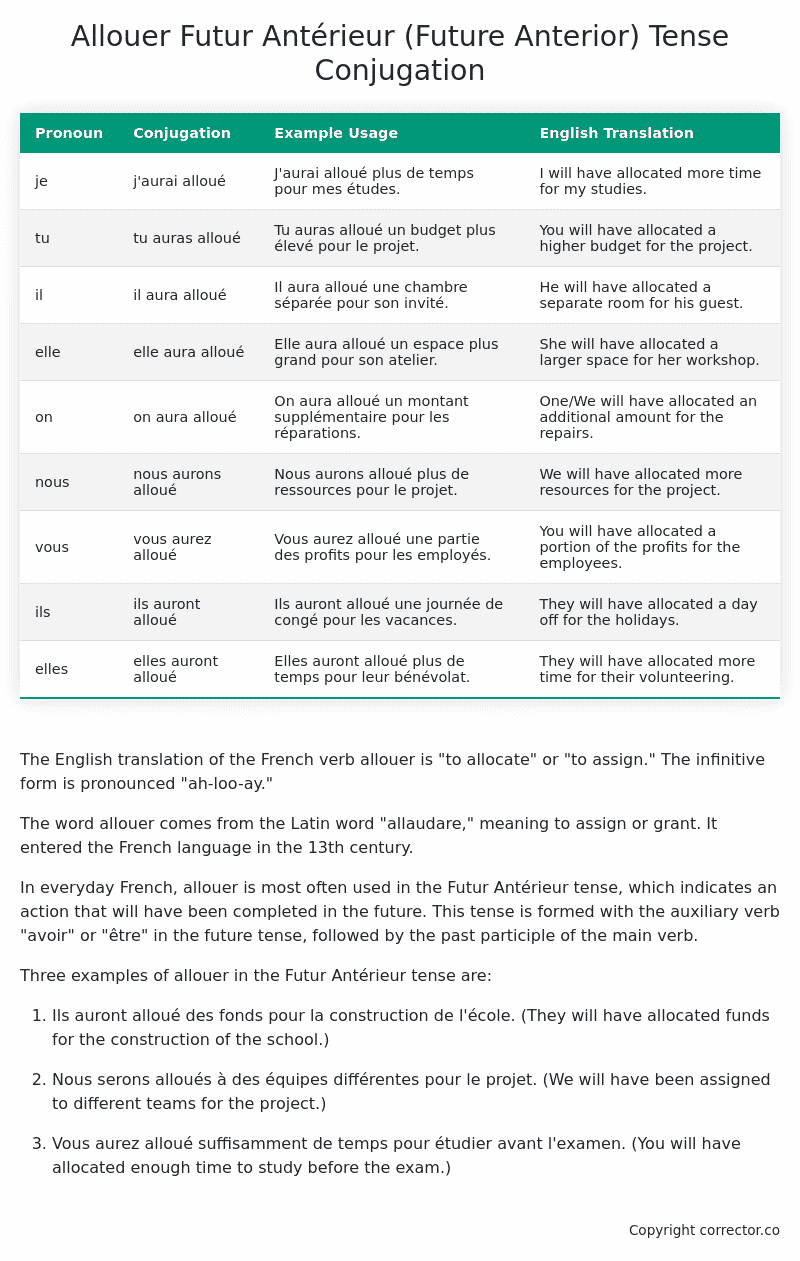Futur Antérieur (Future Anterior) Tense Conjugation of the French Verb allouer
Introduction to the verb allouer
The English translation of the French verb allouer is “to allocate” or “to assign.” The infinitive form is pronounced “ah-loo-ay.”
The word allouer comes from the Latin word “allaudare,” meaning to assign or grant. It entered the French language in the 13th century.
In everyday French, allouer is most often used in the Futur Antérieur tense, which indicates an action that will have been completed in the future. This tense is formed with the auxiliary verb “avoir” or “être” in the future tense, followed by the past participle of the main verb.
Three examples of allouer in the Futur Antérieur tense are:
-
Ils auront alloué des fonds pour la construction de l’école. (They will have allocated funds for the construction of the school.)
-
Nous serons alloués à des équipes différentes pour le projet. (We will have been assigned to different teams for the project.)
-
Vous aurez alloué suffisamment de temps pour étudier avant l’examen. (You will have allocated enough time to study before the exam.)
Table of the Futur Antérieur (Future Anterior) Tense Conjugation of allouer
| Pronoun | Conjugation | Example Usage | English Translation |
|---|---|---|---|
| je | j’aurai alloué | J’aurai alloué plus de temps pour mes études. | I will have allocated more time for my studies. |
| tu | tu auras alloué | Tu auras alloué un budget plus élevé pour le projet. | You will have allocated a higher budget for the project. |
| il | il aura alloué | Il aura alloué une chambre séparée pour son invité. | He will have allocated a separate room for his guest. |
| elle | elle aura alloué | Elle aura alloué un espace plus grand pour son atelier. | She will have allocated a larger space for her workshop. |
| on | on aura alloué | On aura alloué un montant supplémentaire pour les réparations. | One/We will have allocated an additional amount for the repairs. |
| nous | nous aurons alloué | Nous aurons alloué plus de ressources pour le projet. | We will have allocated more resources for the project. |
| vous | vous aurez alloué | Vous aurez alloué une partie des profits pour les employés. | You will have allocated a portion of the profits for the employees. |
| ils | ils auront alloué | Ils auront alloué une journée de congé pour les vacances. | They will have allocated a day off for the holidays. |
| elles | elles auront alloué | Elles auront alloué plus de temps pour leur bénévolat. | They will have allocated more time for their volunteering. |
Other Conjugations for Allouer.
Le Present (Present Tense) Conjugation of the French Verb allouer
Imparfait (Imperfect) Tense Conjugation of the French Verb allouer
Passé Simple (Simple Past) Tense Conjugation of the French Verb allouer
Passé Composé (Present Perfect) Tense Conjugation of the French Verb allouer
Futur Simple (Simple Future) Tense Conjugation of the French Verb allouer
Futur Proche (Near Future) Tense Conjugation of the French Verb allouer
Plus-que-parfait (Pluperfect) Tense Conjugation of the French Verb allouer
Passé Antérieur (Past Anterior) Tense Conjugation of the French Verb allouer
Futur Antérieur (Future Anterior) Tense Conjugation of the French Verb allouer (this article)
Subjonctif Présent (Subjunctive Present) Tense Conjugation of the French Verb allouer
Subjonctif Passé (Subjunctive Past) Tense Conjugation of the French Verb allouer
Subjonctif Imparfait (Subjunctive Imperfect) Tense Conjugation of the French Verb allouer
Subjonctif Plus-que-parfait (Subjunctive Pluperfect) Tense Conjugation of the French Verb allouer
Conditionnel Présent (Conditional Present) Tense Conjugation of the French Verb allouer
Conditionnel Passé (Conditional Past) Tense Conjugation of the French Verb allouer
L’impératif Présent (Imperative Present) Tense Conjugation of the French Verb allouer
L’infinitif Présent (Infinitive Present) Tense Conjugation of the French Verb allouer
Struggling with French verbs or the language in general? Why not use our free French Grammar Checker – no registration required!
Get a FREE Download Study Sheet of this Conjugation 🔥
Simply right click the image below, click “save image” and get your free reference for the allouer Futur Antérieur tense conjugation!

Allouer – About the French Futur Antérieur (Future Anterior) Tense
Construction
Common Everyday Usage Patterns
Interactions with Other Tenses
For example
Summary
I hope you enjoyed this article on the verb allouer. Still in a learning mood? Check out another TOTALLY random French verb conjugation!


